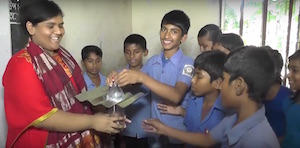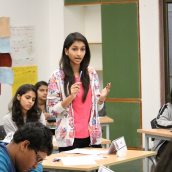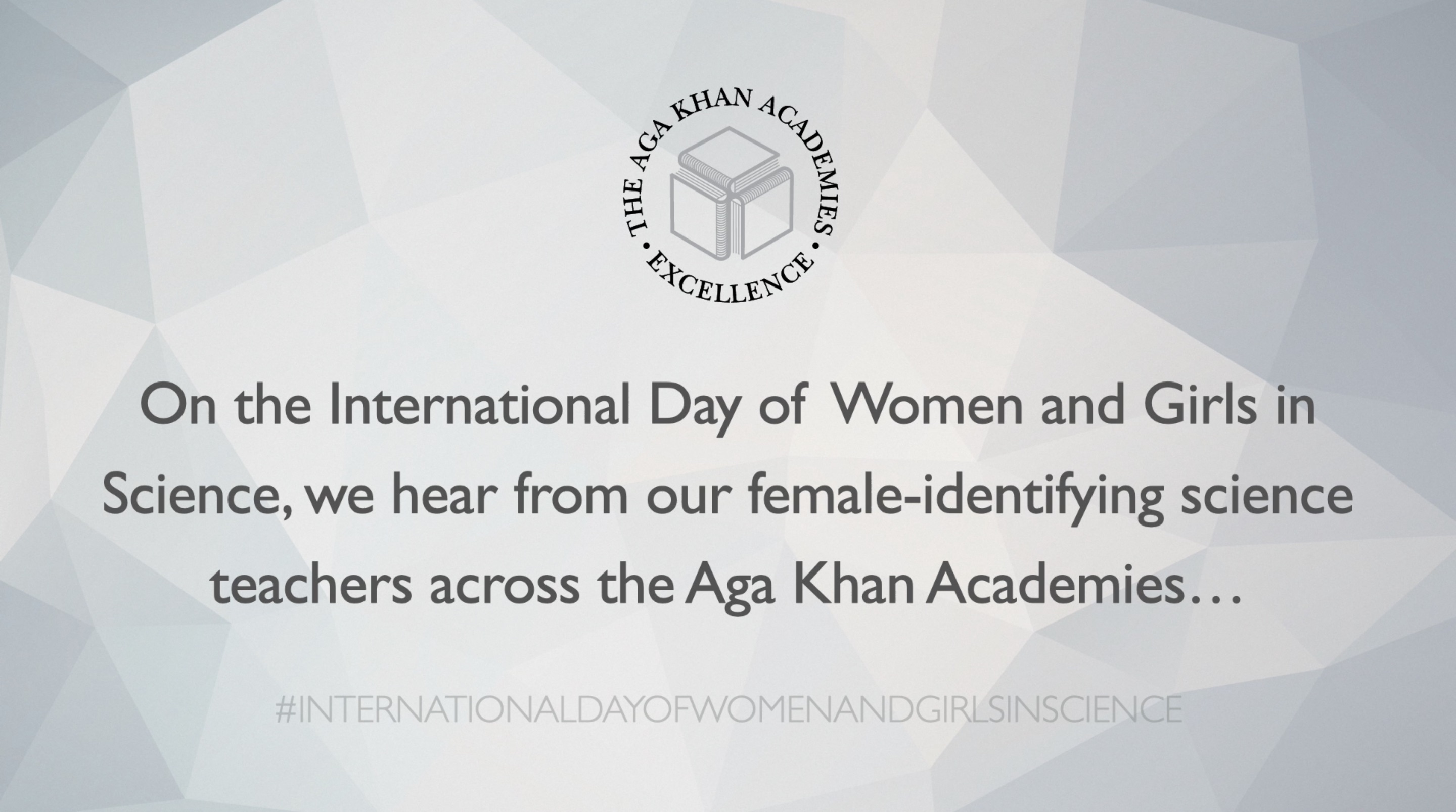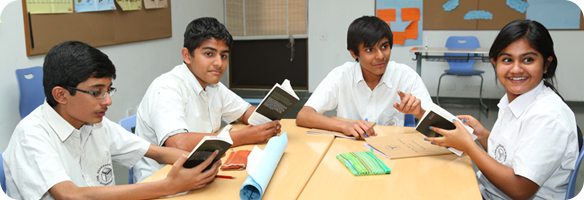
Middle Years Programme
The Aga Khan Academy Dhaka is an authorised International Baccalaureate (IB) World School offering the Middle Years Programme (MYP).Our MYP curriculum for students in Grades 6-10 is part of an integrated curriculum that forms a continuum from the Primary Years Programme (Grades 1-5) to the Diploma Programme (Grades 11-12).
Students study a broad and balanced range of disciplines, including:
- Languages;
- Literature;
- Sciences;
- Social sciences;
- Mathematics;
- Ats;
- Technology; and
- Physical education.
The five Aga Khan Curricular Strands, which are unique to the Aga Khan Academies, are integrated throughout the curriculum.
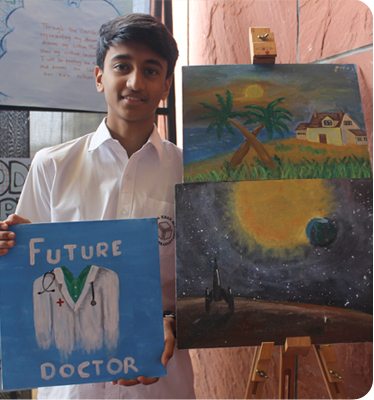 Learning in the middle years
Learning in the middle years
Our MYP students are immersed in a challenging and enriching educational environment. We ensure they master basic skills, develop the ability to analyse and think critically and become computer literate. We also emphasise the development of self-discipline and good work habits.
The programme encourages students to reflect on their learning and make connections with real-world issues. It also helps students develop an awareness of their thought processes and learning strategies, and of how they learn best.
The curriculum includes a service component that makes students aware of community and global needs. We also ensure that each student has a strong leadership experience and receives grounding in ethics, which helps prepare them for future leadership roles.
For further information about applying to Grades 6-10 at the Academy, please see the admission requirements.
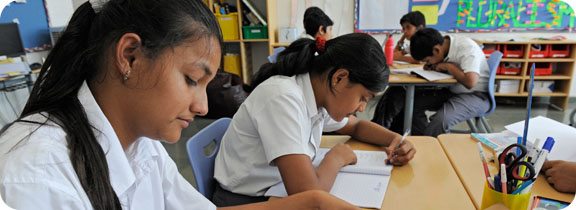
Admissions
The network of Aga Khan Academies has been established to provide exceptional students from all backgrounds with an outstanding education. Admissions are currently being accepted for the Primary Years Programme, Middle Years Programme and Diploma Programme at all Academies.
The Academy seeks students from pre-primary through higher secondary levels, representing a diverse range of economic, cultural, ethnic and religious backgrounds. Students should have the ability and motivation to excel academically and should demonstrate leadership in community service and other co-curricular pursuits.
Selection is based on student merit.
The Academy endeavours to meet the demonstrated financial need of each admitted student.
Candidate characteristics
The admissions committee evaluates candidates based on a range of measures and selects those demonstrating a high level of motivation and commitment to learning, a strong sense of integrity and respect for others from diverse backgrounds.
Successful applicants typically demonstrate the following characteristics:
"The students at this institution will be distinguished not only for their academic capacity, but for their character and commitment to citizenship."
- A record of outstanding academic achievement or potential;
- Highly motivated and intellectually curious;
- A strong sense of integrity – the capacity to judge right and wrong and to stand up for one’s principles;
- A high level of social awareness, including openness and sensitivity to those of different backgrounds;
- The desire to work towards, and instigate, positive change;
- Leadership in community service, student government and/or sporting activities; and
- Notable accomplishments in the visual or performing arts.
Please visit the websites of the individual Academies for further information and application forms.
Nanjiba Sayara: Teaching students in Bangladesh to recycle plastic
My desire was realised through the grade 10 International Baccalaureate (IB) Middle Years Programme (MYP) personal project, a community project that focuses on service learning through practical exploration and a cycle of inquiry, action and reflection. As part of my personal project, I went to a village school in Bangladesh where I taught a group of about 20 students how to recycle plastic bottles, and the importance of such an activity. I chose to focus on this, because recycling plastic is needed to keep our environment safe and it’s a fun activity that would keep the students interested. Please click here to see a video of my experience at the village school.
I was privileged to work with those students, as they were very enthusiastic to learn and contribute. Spending one day with children from different backgrounds made me a better communicator. My parents and I have always believed that extracurricular activities are as important as academics because they contribute to being a balanced individual. I am happy to have done this activity at the village school because it made learning enjoyable and therefore memorable.
The IB MYP personal project was challenging, educational and exciting. My parents always ask me to share my happiness and knowledge with others because it might brighten up someone’s day. I believe my session at the village school accomplished this, so I wish to continue sharing my knowledge, what I have learned and will continue to learn, with my society.
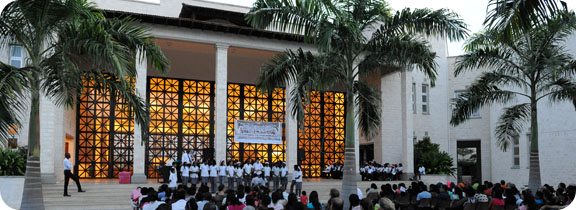
History
In 2000, His Late Highness Prince Karim Aga Khan IV initiated the establishment of the Aga Khan Academies, an integrated network of schools dedicated to expanding access to the highest standard of education.
The Aga Khan Academies is a part of the Aga Khan Schools, an agency of the Aga Khan Development Network (AKDN). The Aga Khan Schools is chaired by His Highness Prince Rahim Aga Khan V, who succeeded his father, His Late Highness Prince Karim Aga Khan IV, on 4 February 2025. The AKDN has a long history of involvement in education in countries of the developing world, with the first schools having been founded in 1905 in Mundra (India), Zanzibar (Tanzania) and Gwadar (Pakistan). Currently, the Aga Khan Schools operate 200 schools, eight hostels and more than 100 non-formal educational programme centres ranging from early childhood through to post-graduate education.
Establishment of the academies
In 2003, the first Aga Khan Academy opened in Kenya on an 18-acre site in the Kizingo area of Mombasa. The Aga Khan Academy Mombasa has already established a highly successful track record, with its students placing among the top tier worldwide in academic performance.
The Aga Khan Academy Hyderabad in India is the second to be established and opened with its first intake of students in August 2011. As with all the Aga Khan Academies, the Academy in Hyderabad selects students of all socio-economic backgrounds who show promise in academic and other areas, and who demonstrate good character and serious intent.
The Aga Khan Academy Maputo in Mozambique opened in August 2013. In August 2022, the Aga Khan Academy Dhaka in Bangladesh opened.
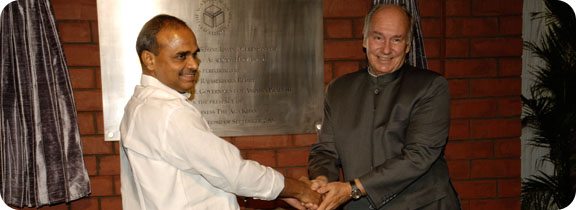
History
In 2000, His Late Highness Prince Karim Aga Khan IV initiated a programme to establish an integrated network of schools, known as the Aga Khan Academies. The aim of the Academies is to provide education to deserving students at an international standard of excellence.
The Aga Khan Academies are part of the Aga Khan Schools, an agency of the Aga Khan Development Network (AKDN), which has been involved in education in developing countries for decades. The Aga Khan Schools comprises a network of 200 schools, more than 100 non-formal education programme centres and eight hostels in 11 countries across East Africa and South and Central Asia.
In 2003, the first Academy was established in the Kizingo area of Mombasa, Kenya. A facility inspired by Swahili architecture, the Aga Khan Academy Mombasa is a state-of-the-art learning institution. It is recognised as an International Baccalaureate World School. The Aga Khan Academy Hyderabad was the second to open in 2011, followed by the Aga Khan Academy Maputo in 2013 and the Aga Khan Academy Dhaka in 2022.
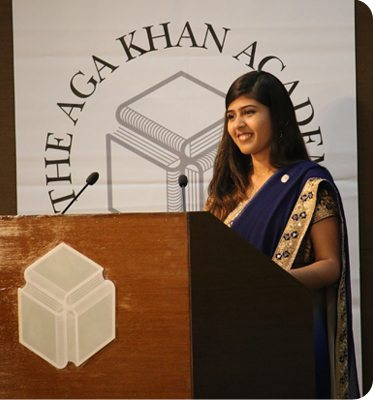 Establishment of the Aga Khan Academy Hyderabad
Establishment of the Aga Khan Academy Hyderabad
Construction of the Aga Khan Academy in Hyderabad began in 2006. The first intake of students was in August 2011 for the Junior School and 2012 for the Senior School, including the residential programme. The Academy has been accredited as an International Baccalaureate World School for the Primary Years, Middle Years and Diploma Programmes. The first class of the Senior School’s Diploma Programme graduated in 2014.
The Academy's Professional Development Centre (PDC) began operating in July 2010, prior to the opening of the school. The first programme offered by the PDC was a series on Professional Learning for Educators. These are collaborative courses designed by the Aga Khan Academies with input from government and educational experts. Their aim is to improve the education of both students and teachers within the region.
A global learning community
The vision for the Aga Khan Academies is for them to become an interconnected network of schools that form a global learning community. The work of the Academies is also enhanced through partnerships with other educational institutions and the agencies of the Aga Khan Development Network.
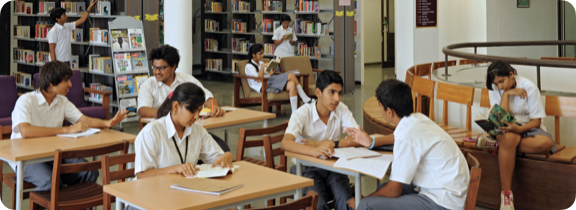
Admission Requirements
The Academy uses a multifaceted assessment in identifying students. The assessments enable students to demonstrate their cognitive, literary, mathematical, creative and leadership abilities.
Admission is competitive and based on student merit.
Please click here to get more information.
Nursery School
Kindergarten 1, 2 and 3: Early Years Programme
Students entering Kindergarten 1 must be 3 years of age by 31 July of the year of entry.
All prospective students must demonstrate the potential for high achievement. Each applicant will participate in a variety of assessment exercises. Assessment exercises include different sets of skill tests (communication skills, social skills and motor skills).
Junior School
Grades 1–5: Primary Years Programme
Students entering year 1 should have completed at least three years of nursery school and must be 6 years of age by 31 August of the year of entry.
All prospective students must demonstrate a potential for high academic achievement and demonstrate competency in literacy and numeracy. Each applicant from Grades 2-5 must sit a standard assessment in logic, English (reading and writing), mathematics and creativity. Applicants will also have personal interviews with key members of the Junior School staff as part of their application process.
Senior School
Grades 6–10: Middle Years Programme
All students applying for a place in the Senior School must have attained high scholastic achievement in their former educational institutions. They must also demonstrate a keen interest and participation in community service projects outside the classroom and/or extracurricular activities such as sporting activities, clubs, arts and music.
All applicants must schedule an appointment for a standard assessment test in logic, English, mathematics and problem-solving at the school, in addition to providing past student grade reports and certificates of achievement. Applicants will also have personal interviews with key members of the Senior School staff as part of their application process.
Diploma Programme
Grades 11–12: Diploma Programme (DP)
Applicants for the International Baccalaureate (IB) Diploma Programme at the Aga Khan Academy Dhaka, must have demonstrated outstanding academic achievement as well as a proven record of civic mindedness and participation in community projects.
The application process requires prospective students to undergo a standardised assessment test in English, mathemathics and logic as well as an interview with IB Diploma Programme coordinators and key members of the Senior School staff.
New students will not be accepted in the year of the Diploma exam.

Aga Khan Curricular Strands
The Aga Khan Curricular Strands (AK Strands) are a unique part of the programme offered by the Aga Khan Academies. The AK Strands are areas of learning aimed specifically at developing knowledge, skills and attitudes required by future leaders.
Our goal at the Academies is to develop young people who have strong local roots and are also globally minded. They should be able to become leaders in whichever fields they choose.
To help achieve this goal, we have identified five areas of learning, the Aga Khan Curricular Strands, that we believe are important for our students. These are:
- Ethics
- Pluralism
- Cultures (with an emphasis on Muslim civilisations)
- Governance and Civil Society
- Economics for Development.
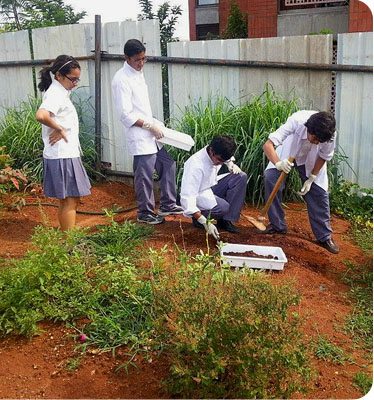 Implementing the AK Strands
Implementing the AK Strands
The Aga Khan Curricular Strands are not taught as independent subjects. Instead, we weave them into the existing subject areas of the academic curriculum. They help inform the selection of content and themes for study. The AK Strands also provide direction for school life outside the classroom in areas such as policy making, recruitment, student life and residential life.
Two of the AK Strands, Ethics and Pluralism, help students develop values and dispositions required by ethical leaders. Our students learn about these areas in theory and are also encouraged to practice what they learn in their everyday lives.
Through the other three AK Strands, our students learn about ideas that are important to the functioning of societies. In particular, they learn about how these ideas impact people’s lives in countries of the developing world. The knowledge they gain helps them understand key issues from both local and international perspectives.
The AK Strands in practice
The Aga Khan Curricular Strands were developed at the first Aga Khan Academy in Mombasa and are designed to be used in different cultural contexts. Teachers at the Aga Khan Academy Hyderabad helped tailor the AK Strands for the local environment in India.
For example, Grade 3 students worked on a history and geography unit about Hyderabad that related to Economics for Development. The students examined how the physical features of the area influenced the city and its economic activity. They learned about employment today and also looked at traditional forms of work, including a visit to a nearby weaving cooperative. This unit helped the students understand both general ideas about economics and their impact on daily life in Hyderabad.
Through the Aga Khan Curricular Strands, our students develop attitudes and values that will help them throughout their lives. They also gain knowledge and understanding that will allow them to contribute positively to their societies in the future.
For more information on the educational programme offered at the Aga Khan Academy Dhaka, please visit the Academic Programme page.
Syeda Sayema Mayesha – tackling global issues through film
Watch Sayema's film "One Sky, Two Souls" below.
Sayema, currently in grade 11, directed and produced an impactful short film to create awareness on child rights for her IB MYP Personal Project towards the end of her IB Middle Years Programme journey. The film was screened in February 2017 at the Academy’s annual ‘innovation expo’.
What caused her to pursue this particular project? “I was inspired to make this film as I have often observed how privileged children do not appreciate what they have, whereas the ones who suffer continue to do so as they are neglected,” Sayema explains. “As a student of the Academy, where children are given the opportunity of holistic education regardless of their financial background, I could not have worked on a better project.”
Sayema is from Bangladesh and studied at the Aga Khan School in Dhaka before joining the Hyderabad Academy in 2014. Her favourite subject is I&S (Individuals and Societies), particularly Economics, because she loves how it engages students and sharpens their perception about the real world. “15 years from now, I see myself completing my higher studies in International Relations and working as a Public Relations Executive. The Academy has influenced this career choice as it has broadened my knowledge and perspective about the world making me enthusiastic to be a leader and play a part in constructive change.”
Soccer is a passion for Sayema, and she has been part of the Academy Senior School girls’ soccer team from the beginning. “It has been a splendid experience for me to play home ground tournaments as well as outside tournaments and win the first ever trophy for the team in Kerala.” Another momentous occasion for her was when she won the ‘Best Delegate Award’ at her first ever Academy Model United Nations in 2015. She is now a passionate MUN participant.
Her knowledge of global issues and her desire to contribute to social change is evident through the film that she made, discussing child rights through the angle of education and labour. “Ensuring child rights today will ensure a brighter future for all tomorrow. The entire process has taught me many aspects of filmmaking. It has taught me to become a leader while working with a team. I have learnt how to deliver stories to the world through my own lens.”
Watch Sayema's film:
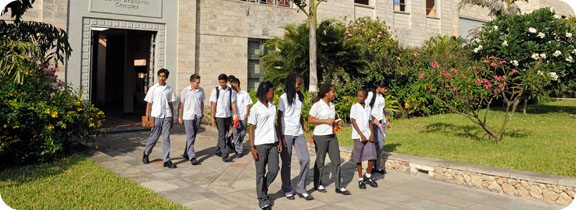
Introduction to the Aga Khan Academies
In 2000, His Late Highness Prince Karim Aga Khan IV initiated the establishment of the Aga Khan Academies, an integrated network of schools located in countries across East Africa and South Asia.
The aim of the Academies is to develop future leaders with the skills and knowledge to support positive development in their societies. The Academies achieve this by recruiting exceptional young people from all backgrounds and providing them with the highest international standard of education.
Admission is based upon merit, with financial aid available to ensure access for accepted students regardless of financial circumstances.
Global network
The first Aga Khan Academy opened in Mombasa, Kenya in 2003, the second in Hyderabad, India in 2011, the third in Maputo, Mozambique in 2013 and the fourth in Dhaka, Bangladesh in 2022.
Rigorous academic programme
The academic programme offered by the Academies has been developed according to the principles of the widely-recognised International Baccalaureate (IB). The IB provides a challenging academic environment for students and allows their achievement to be measured against international standards.
In addition to providing a rigorous academic and leadership experience, the Academies help students develop an ethical and public-minded outlook through community service opportunities and education on ethics and pluralism.
“An education must equip students with the tools that enable them to adapt and thrive in a world characterised by change.”They also recognise that to become effective leaders, students must be both globally minded and locally rooted. Global as well as local perspectives are reflected in the curriculum, and students study in both English and the local language.
Purpose-built residential campuses
Each Aga Khan Academy campus is architect-designed and purpose-built. They feature state-of-the-art classrooms and resource areas and extensive sports facilities.
The residences provide secure and well-supervised accommodation for local and international students as well as those visiting from another Academy. Additionally, both students and teachers participate in visits and exchanges between Academies to broaden their experience and practical understanding of pluralism.
Professional development
Promoting excellence in teaching, both on campus and more broadly, is a major goal of the Academies. Each Academy is established as a Professional Development Centre (PDC). The PDC aims to strengthen the profession of teaching in the region by providing substantial professional learning opportunities and modelling highly effective educational practices.
